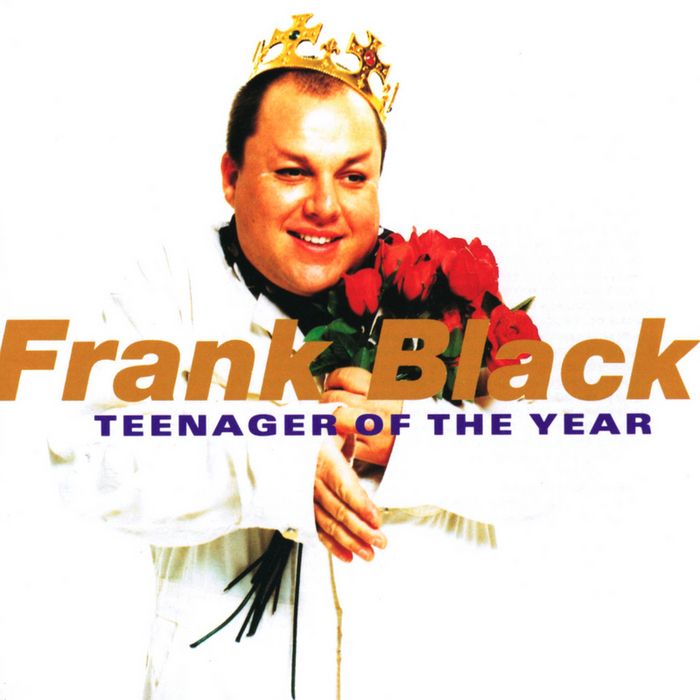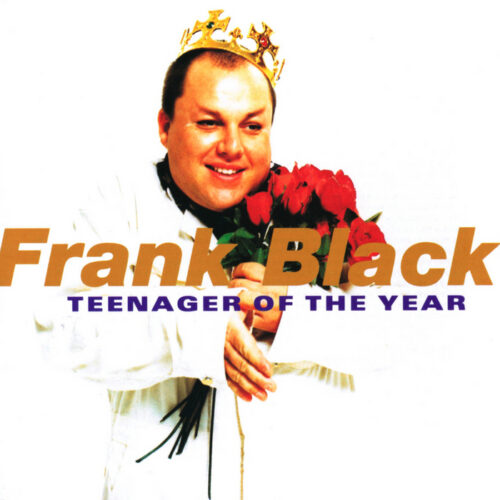The cruelest trick a record sleeve can play on you is to make you look at it through fresh eyes. The character on the cover, the avuncular savant and elder statesman that you used to look up to with some reverence, is suddenly – horrifyingly – ten years younger than you are now, and a lot fresher-faced and strangely more handsome than you remember. When I say ‘you’, I clearly mean ‘I’. It’s difficult to say what I would have thought regarding the cover art for Teenager Of The Year 20 years ago, but there would have been no uneasiness and certainly no suspicion of regret back then. I hope I would have got the humorous irony; that this slightly overweight, balding grown-up is reimagined as prom queen. The debutante’s ball – so prominent in US culture – is a little lost on us on this side of the Atlantic, but even we can fathom that being one of the less popular kids looking in at all the favouritism and the frat boys and those Mormon smiles must turn your heart as black as bitumen. Maybe this cover is sweet revenge to Frank Black’s former detractors; like Carrie without all the blood?
Whatever the ideas behind it, it was Charles Michael Kittridge Thompson IV’s first appearance on the outer jacket, and it was his last record for 4AD. The second of his solo records recorded with rock veteran Eric Drew Feldman (keyboardist for Pere Ubu and Captain Beefheart), this was a step up in terms of unfettered inventiveness, and listening to it now it’s hard not to feel it’s as good as anything the Pixies ever recorded, and possibly more audacious.
Teenager Of The Year might have been retrospectively pulled from a wreckage of antipathy by Pitchfork recently and held up as a beacon of ingenuity in its Top 100 albums of the 90s feature, but at the time it was seethed at for flying in the face of fashion. Released at a time when grunge had become bloated and the playful precocity and capriciousness was out of kilter with the genre’s self-righteous, funereal mood. Twenty-two songs and many of them under two minutes? Guitar solos and outbreaks of cod reggae? Who does he think he is?
Pixies have been living with the expectations that come with early flourishes of genius for a quarter of a century now, and in that sense you can see why they held off recording a collection of new material for so long in their second life. The sheer force of ambivalence from hardcore enthusiasts just waiting to criticise anything that stepped out of the perimeters of their own compartmentalisation must be discouraging. The Pixies it seems don’t know what’s best for the Pixies. No wonder they said, ‘Fuck you’ for so long, until they couldn’t feasibly go on with the same circus of tricks for yet another round of heritage knees ups. Recent myth-making would have you believe the Boston four-piece were unimpeachable throughout their entire premier incarnation, but the way I remember it post-Doolittle, nothing ever quite measured up for some. Not the righteous Trompe Le Monde, certainly not Bossanova. It stood to reason that Indie Cindy would get panned, despite it being far better than anyone could have reasonably expected.
And flying solo, Charles has endured the brickbats and the sort of affronted derision that might make you change your name and move town, or even give up on the rock & roll altogether. It’s no wonder those latter Frank Black albums started to sound like Dire Straits. Thompson is also not given to people-pleasing, and you sense his epidermis is as thick as any antediluvian megafauna you might care to name. Like most obstinately gifted artists, Charles Thompson or Black Francis or Frank Black ploughs his own furrow whatever he might be calling himself at that time (but let’s stick with Frank Black from now on to avoid any confusion). His solo career swings from eyeball-slicingly sharp, to bafflingly banal, but you suspect that neither criticism nor outpourings of praise will deter him from his purpose.
Teenager Of The Year falls into the ‘eyeball-slicingly sharp’ category, and it’s also a hurricane of purposefulness. It’s the sound of ideas meeting with musical dexterity and then getting bored and moving swiftly onto the next thing. It rarely pauses for breath. It’s as lean as it is madcap. It’s as though it was all written and recorded in one manic episode. It’s the aural equivalent of the Mark E Smith book Renegade, in that it can be confoundingly conservative one minute and then brazenly outré for the next three. What’s more you can’t put it down. The Knophlerisms that would so define the later Frank Black albums creep in on tracks like ‘Speedy Marie’, but set against the sheer forceful exuberance of ‘Whatever Happened To Pong?’ or ‘Freedom Rock’, any muso muscularity is forgiven. Besides, the songs on this LP, one after another, just keep blowing you away.
‘Headache’ – the hit – is a fair indication of what to expect, which of course is to expect the unexpected. The tune is as deliciously catchy and Orbinsonesque as anything he’d previously written, but underlaid throughout the verse with a bassline that keeps ascending to denote pressure, it culminates in a remarkable chorus that sounds like pop’s most mellifluous migraine.
Songs come and go in quick succession, as does that warm feeling of recognition when yet another beauty kicks in. ‘I Could Stay Here Forever’ follows ‘Fazer Eyes’, and both are tuneful and vocally varied enough that they too could have been written for The Big O, the former especially. ‘The Vanishing Spires’ follows ‘Calistan’ which follows ‘(I Want To Live On An) Abstract Plain’, all of which make the heart swell with joy at the sheer ease Frank has with a tune when he’s in the mood.
Lyrically he’s as opaque as we’ve come to expect, aside from ‘…Abstract Plain’ itself, which threatens to let the cat out of the bag as he attempts to explain the mechanics of his weird thinking. It’s better when he just gets on with singing about Siberia, harvest moons and ‘Yakety Yak’ in ‘White Noise Maker’, and while you might have no idea what he’s going on about, it makes better sense than him trying to quantify the processes of his creations. Kurt Cobain learnt everything he knew from Frank, and in another life Edward Lear would have stood prostrate before him proclaiming unworthiness and André Breton would have invited him to join his gang. Few have ever conveyed sheer nonsense so artfully.
As for the arsing around, the subverting of genres, the merging of styles and ideas, well that’s one of the things that makes Teenager Of The Year so thoroughly enjoyable. “They tried to give me advice, down at the record shop,” sings Frank over a white boy reggae interlude, “I said, ‘Sit down boys, this may comes as a shock.’” Frank and his band then go into a pitch perfect Clash impression while he admonishes the snooty shop assistant bastards, and it’s as funny as it is vivid. The intro for ‘Olé Mulholland’ chugs along in a confused post-punk kind of a way before flipping and becoming a rock & roll tune with doomy, dampened chords and a resounding fucking cowbell clattering through it, while Frank growls: “Hey sleepy monster in the sand / Time to get up and have a drink." ‘Superabound’ begins like a saucy Pulp tune before it becomes a jaunty Fall number, and ‘Big Red’ is a dirty blues shuffle that’s probably memorable mostly for its unflinching simplicity.
Teenager Of The Year feels like a lost Pixies album in the way Ram feels like a lost Beatles album. It’s colossal, it teems with innovation. It’s as discombobulating and in many ways as impenetrable as anything the great man has ever done, and all the better for it. Indie Cindy might be a welcome return (well I think it is) but seek this out again or seek it out for the first time – because it might just be the highwater mark. Black Francis might not have all those tunes bursting out of his locker now, but they’ll never be able to take those teenage accolades away. He probably looks back at that photo with the crown and the bouquet of blood red roses and wonders where the time has gone as well.



